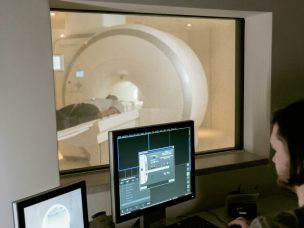Prostate Cancer
Bipolar Androgen Therapy With Nivolumab for Metastatic Castration-Resistant Prostate Cancer
Results of a phase 2 study indicate that bipolar androgen therapy with nivolumab may augment the anti-tumor immunologic response of the body against metastatic castration-resistant prostate cancer, which is further strengthened by immune checkpoint inhibition. Bipolar androgen therapy (BAT) in metastatic castration-resistant prostate cancer (mCRPC) patients drives testosterone levels above the physiologic range and then...
Prognostic Significance of Surgery and Radiotherapy in Localized Prostate Cancer
A randomized controlled trial found that nomograms based on multiple Cox regression models could effectively predict the risk factors associated with overall survival and cancer-specific survival in patients with localized prostate cancer as well as assess survival differences between surgery and radiotherapy. Prostate cancer affects a substantial proportion of men across the globe, with more...
Health Coaching Program for Metabolic Syndrome in Prostate Cancer Patients
A nurse-led mobile-based health coaching program promoted positive lifestyle changes that improved various parameters of metabolic syndrome in prostate cancer patients. Prostate cancer patients are prone to adverse metabolic changes that stem from the physical effects of androgen deprivation therapy (ADT). These changes include body fat accumulation and abnormal fasting glucose levels, with subsequent development...
Deep Learning Algorithm-Based Prediction of Bone Metastases in Prostate Cancer
A retrospective cohort study finds that multimodal radiomics and pathomics based on deep learning algorithms are useful tools for predicting the risk of bone metastases in patients diagnosed with primary prostate cancer. Bone metastasis is a common consequence of disease progression in primary prostate cancer patients and plays an important role in the morbidity and...
Prostate-Specific Antigen and Magnetic Resonance Imaging for Prostate Cancer Screening
Secondary analysis of a prospective trial finds that while repeated screening for prostate cancer is crucial to the detection of pathology, the proportion of magnetic resonance imaging scans that prompt suspicion of cancer is relatively low. Prostate cancer screening with prostate-specific antigen (PSA) plays a pivotal role in decreasing cancer-related mortality. Screening with PSA testing...
AZD4635 With Durvalumab or Oleclumab for Metastatic Castration-Resistant Prostate Cancer
A newly published phase 2 study finds that the antitumor effect of AZD4635 with durvalumab or oleclumab is minimal in pretreated metastatic castration-resistant prostate cancer, with the treatment regimen being well-tolerated and generally safe. Metastatic castration-resistant prostate cancer (mCRPC) has a poor prognosis and limited overall survival rates. The standard treatment for mCRPC patients comprises...
Beta-Sitosterol Supplements for the Treatment of Prostate Cancer
Beta-sitosterol supplements seem to be most appropriate for younger men with minimal symptoms who wish to avoid clinical drug regimens for benign prostatic hyperplasia treatment, according to the findings of a recent literature review. Herbal supplements containing plant sterols, vitamins, and minerals are widely used to enhance prostate health. Beta-sitosterol often forms the most abundant...
Radiomics Models for Predicting Biochemical Recurrence of Advanced Prostate Cancer
Radiomics models based on automatic segmentation of pretreatment apparent diffusion coefficient maps showed promise for predicting the biochemical recurrence of advanced prostate cancer in a recent study. Many prostate cancer (PCa) patients experience biochemical recurrence (BCR) during treatment. Early BCR detection is essential for timely intervention to limit disease progression and improve survival. Radiomics is...
Effect of Positive Surgical Margins on Post-Robotic Radical Prostatectomy Mortality
The presence of multifocal positive surgical margins after robotic radical prostatectomy was associated with mortality in patients with adverse clinical and pathological characteristics in a retrospective cohort study. Positive surgical margins (PSMs) represent an adverse feature in prostate cancer patients undergoing radical prostatectomy (RP). PSMs are common post-RP and found in 6–40% of patients. Although...
More Medical News














